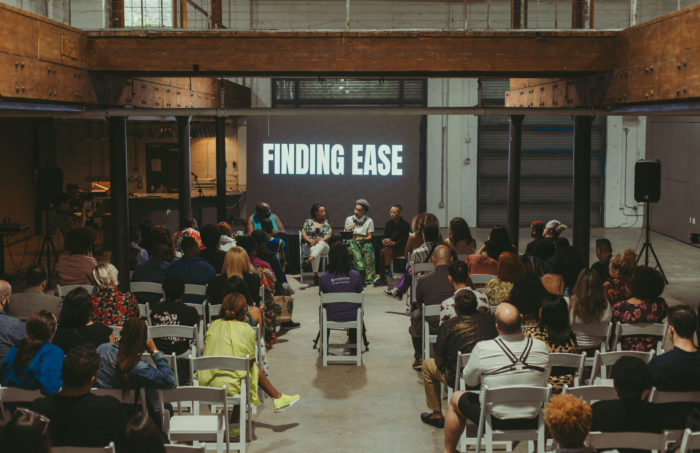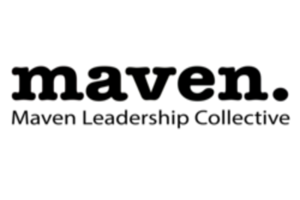Maven Rising returned for its fourth year, this time in an intimate setting at Little River’s Ironside and with a pointed focus on celebrating what most organizations keep taboo–failure. Guests gathered to celebrate Maven’s annual leadership cohort, listen to their inspiring narratives, and mingle among like-minded community with an added twist. This year, Maven G Wright (she|her) introduced the inaugural Epic Failure Award, which recognizes the power of experimentation and learning along the way–even if that means falling flat on your face first. By the end of the evening, guests cheered on Maven Iman Clark’s (she|her) burlesque performance, followed by an obligatory electric slide. But as everyone headed home, they left with a reminder that as long as you have a supportive community, failure does not have to be an end to achieving your goals.
“Zora Neale Hurston warned us that if you are silent about your pain, they’ll kill you and say you enjoyed it,” said Maven founder Corey Davis. “The systems of oppression directly at work require daily contesting. Part of the reimagining should be done by the folks that were left out of the original design, and those who are closest to the critical issues…but we are also much more than our trauma.”
For the collective’s first Epic Failure Award, two winners, Andrés Acosta Ardila (he|him) and Hector Machado (she|they), who shared video testimony about their own public “face plants” split a $1,000 prize. Ardila, who also delivered the Power of One Community speech, shared his experience as a recovering addict which has led to his championing of HIV research and education in Orlando. For the Epic Failure Award, Ardila recounted a story about being given the opportunity to lead a study on an HIV vaccine, only to fall short on the number of participants who signed up. He felt defeated, but reminded himself that with preventative medicines like PrEP, the demand for an HIV vaccine is not the same as it is elsewhere in the world.
“We were set up to fail,” said Ardila. “I felt like I had completely bombed, I felt like my first chance to lead something had gone horribly wrong. I felt like everything I did was for nothing. But it wasn’t for nothing. I was able to learn how to manage a budget for the first time….But, most importantly, it gave me an outlet to refuel my power to fight back against the virus in my own way, even though everything failed.”
Machado likewise suffered a setback to their plans to be a dancer when they had to amputate their legs. Now, Machado is a performer and choreographer in the Pioneer Winter Collective and is hoping to raise funds to purchase chairs for their seated choreography.
“I thought my amputation was the end of my career,” Machado said. “When this first happened to me, the amputation, I [thought], what am I going to do and then you notice that people are looking at you differently, so I just used this as my power. My amputation is my power, I was confident when I was 6’5”, so what’s the difference now that I’m in the chair?”
Machado and Ardila both reminded guests that nobody is perfect, but with the support of the community, anything is possible.
During a panel discussion with art practitioners including Marie Vickels (she|her) and Najja Moon (she|her), Davis prompted, “Where does the word, ‘ease’ take you? Where do you feel it in your body? What memory might come to mind? What hopes might you conjure?”
“And then in terms of how that, what that looks like navigating space, I want to be able to have more trust in my discernment. That ease doesn’t necessarily mean not having moments of difficult decisions, or that things will be easy,” said Moon.
Vickels reminded the audience that the reason they continue their work is to live in a world that is just, that is equitable, that “supports all of us.”
“I think it’s sometimes in small ways, just finding that ease within ourselves just to exist in the world, to feel comfortable to be in our space in our flow,” said Vickels. “We talk about just finding that at ease within your body, it’s also within your mind, it’s a state of being. I think that eventually I want to see that ripple out to a place where everyone can feel at ease. I think that’s why it’s important.”
At the end of the evening, guests mingled across Ironside’s manicured pavilion. After the latest leadership cohort received their iconic fans, the cohort flipped the script on Davis and paid it forward with a gift of their own. The group gifted Davis with an all-inclusive spa treatment–if we don’t take care of the folks who care for us, then how will our systems of support be sustainable? The sun set on Maven Rising for another year as ease found its way back into the community.









